Lessons from the field: Vision, respect and relationships - the cornerstones of great leadership
Auckland Rugby Union's head coach, former All Black and NZ rugby coach of the year, Alama Ieremia, shares his insights into what makes a great leader - whether on the rugby field or in business.
At Endeavour we know that implementing a new Enterprise Resource Planning (ERP) system is highly disruptive for both your employees and your customers. Not only that, but it will generate significant change for many staff whose roles will change when the new system goes live.
We’ve discussed how to manage risk, so that a business is better prepared for any hiccups that can occur along the way. But managing the human element of a big change is just as crucial to a successful outcome – and that management is down to great leadership.
It was with that in mind that we sat down with Auckland Rugby Union’s Head Coach and former All Black Alama Ieremia. Alama came on board with the ARU late last year, and we were keen to get his take on what qualities make a great leader – especially when implementing significant change.
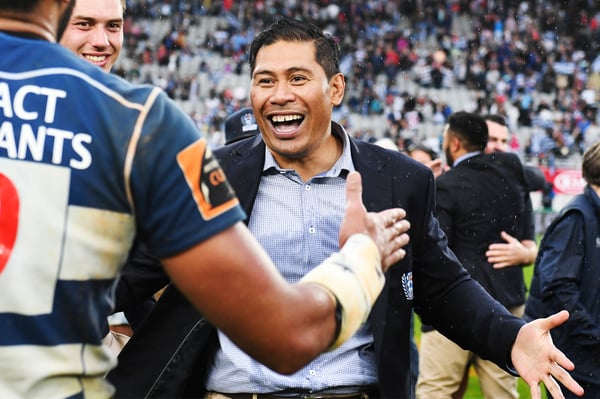
What makes a great leader?
There are qualities that all great leaders possess – whether it’s in business, sports, politics or entertainment. Alama is quick to enumerate them - vision, communication, leading by example, emotional intelligence, toughness, resilience. “The trick is to combine as many of these qualities as possible,” he explains. “It depends on the situation as to which ones are most valuable, but good leaders possess all of these qualities to some degree.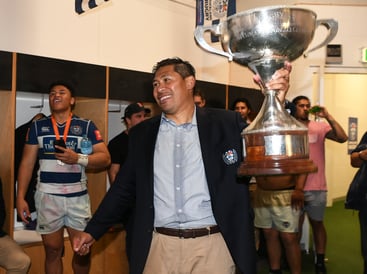
When considering the great leaders he has known and worked with, Alama goes right back to his teenage years. ““All the great leaders that I've learned from - from my father, who was a college principal and a First XV coach, to (former All Black coach) Wayne Smith and (current England coach) Eddie Jones - had the ability to connect, and form relationships, with their players,” he recalls. “Exceptional leaders forge relationships that last beyond the playing years. They also have the ability to be adaptable and empathetic.”
Looking back to move forward
“In professional rugby, you have to know how to get information across to build and maintain a good team - how you do it, what your support systems are, who's required for what job,” Alama explains. “It's essential to have a very clear vision, and one that people can buy into. There's no point trying to push a vision that can't be reached, that's not attainable.”
This is easily relatable to the starting point of an ERP implementation. Staff need to understand and be clear about why the new system is being implemented, and what benefits it will bring to the business as a whole.
Alama goes on to emphasise the need to gain an understanding of the history of the team you’re working with. “Leaders who want to achieve significant change - like taking a team in a new direction - need to have some knowledge of the team's history, because once you know that, you can identify what was working and what wasn't,” he explains. “That's where you have your starting point for implementing change. It's one thing to try and make a change, but if it's related to the past and people are aware of why you're doing it, you've got a much better starting point.”
Accountability and mutual respect across the team
Having a clear vision of what a business is trying to achieve by implementing a change as significant as a new ERP is essential. This means everyone needs to be on the same page and have the same level of understanding. 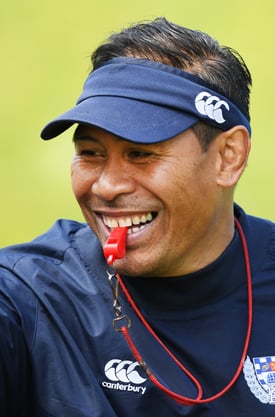
When Alama first came on board as Head Coach, he looked at the team’s history and discovered that this was an area that needed improvement. “I wanted to make sure that everyone earned the respect of everyone else. That was one of the first things I did,” he says. “So, it didn't matter if you were a Super Rugby player, or an All Black or you've come straight from a First XV with only one year out - you had to earn each other's respect, and that meant breaking down barriers and prejudices. There's no room for snobs - we're all the same. If you see behaviour that's not conducive to mutual respect, you jump on it. You hold each other accountable for it.”
Strong, simple communication is critical
One of the main reasons that ERP implementations fail, or take longer than they should, is because a clear communications plan has not been worked out at the design phase of the project. If staff across the business aren’t in the loop about what’s happening, they’re more likely to resist the new system when told they have to start using it.
If a business has taken the time and undertaken the expense of a new ERP, it defeats the purpose if it’s not being used effectively. And the most common cause of this are staff who’ve been kept in the dark from the beginning, resisting the change when it comes.
“Successful change management is down to strong communication. In terms of professional rugby, you have to communicate in a strong, direct way,” Alama explains. “It doesn't help to be wishy-washy. Some of the management jargon you hear in business wouldn't work in rugby. Plus, although you're communicating to the team as a whole, you need to look at people individually and tailor the way you talk so that the message gets across. Like I said before, it's about having empathy and building relationships. If you get to know your players and what makes them tick, you'll find it easier to earn their trust. And as a coach, that trust is critical.”
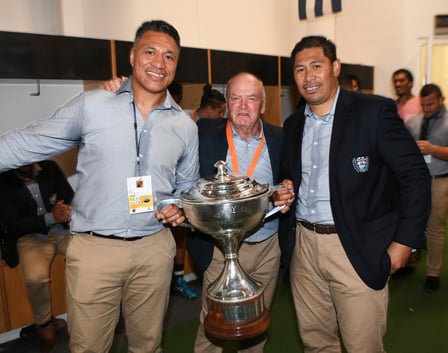
Combine it all to crack the tough nuts
In any organisation – whether it’s rugby or business – that have people working together as a team, there’s usually one or two who struggle with change and are resistant to it. They tend to be people who've been with the business a long time, and have developed their own way of doing things. They believe they know the best way to do their job for the benefit of the company, and may well resent a change that will shake up their department and their working lives considerably.
“If you’ve got to know the history of the team, and each player individually, you’ll have a better idea of why they’re digging in their heels,” Alama explains. “Is it the change as a whole, or just a part of it they don't like? Then what you have to get across to them is that this is a team. We're all going in the same direction and working towards the same goals. Once they understand that, they'll get on board. Ensuring they feel valued and are important to moving forward is critical. If you alienate and avoid the tough conversations, it will be hard to make change.
“And again, if you've got to know them, you'll identify what they need to do their job better. It also goes back to what I said earlier about respect - if everyone respects each other, they will value each other's opinion. So if someone's resistant, for whatever reason, they know their opinion still counts. But they also know that for the team to be successful, everyone has to be on the same page. It’s ok to disagree, but it’s not ok to not commit if it’s a team call.”
Team leadership is one of the most critical aspects of a new ERP. If you don’t have everyone on board, you could be facing a costly and disruptive failure. Change is difficult for many people, so it’s essential to understand and manage the anxieties they’re dealing with.
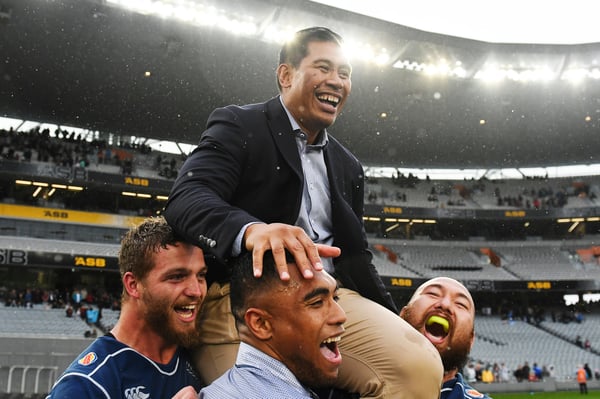
The qualities that make an effective leader are relevant across industries, including professional sports. As Alama has demonstrated, achieving significant change in a professional rugby team is not without its challenges, many of which are relevant to change management in business.
Really great leaders are always seeking ways to improve, one of which is to learn from the best. Alama Ieremia has done just that over his long career in professional rugby, and they’re lessons business leaders can benefit from just as much.
Read our case study of Endeavour implementing MYOB Advanced for the Auckland Rugby Union. For more ideas on managing the people aspects of ERP projects, download our eBook Software is the easy part.
You May Also Like
These Related Stories
.png)
Facing the challenges of shifting market conditions and rising costs?

Thinking of investing in an ERP system? Why you need to conduct a Business Process Review first
